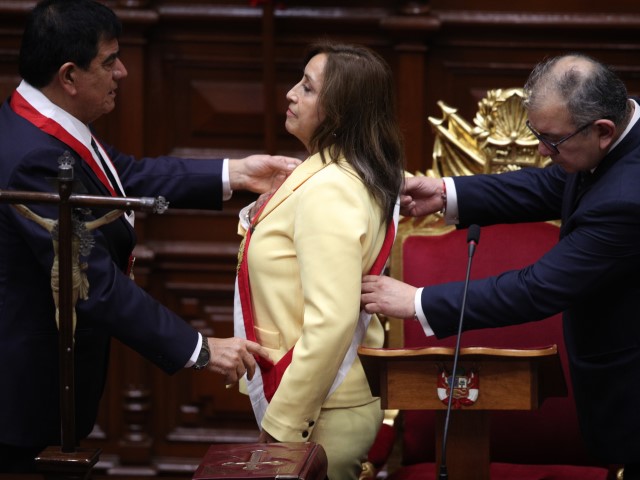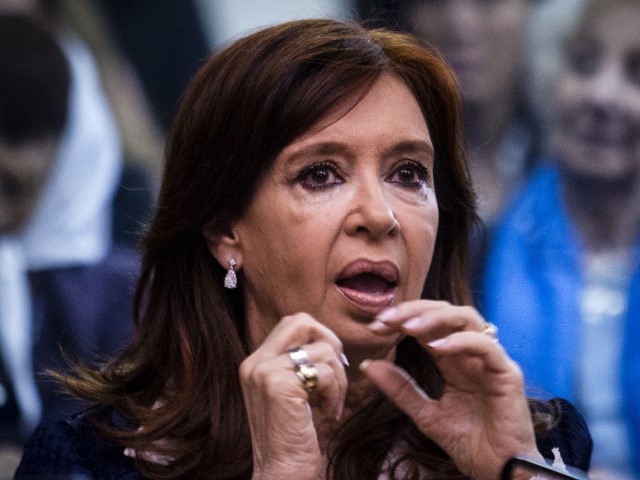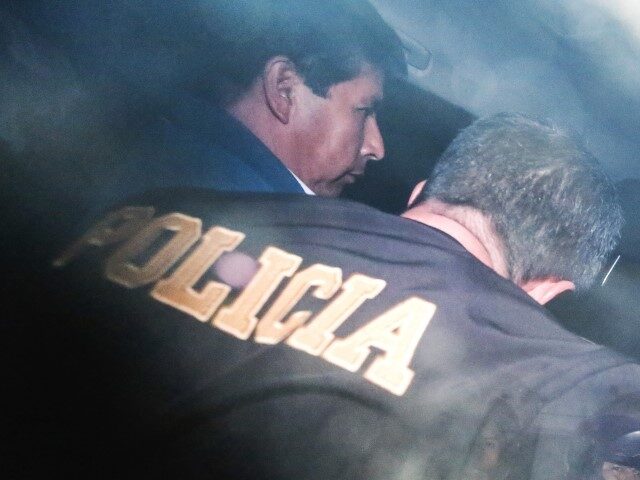CARACAS — The vice president of the United Socialist Party of Venezuela (PSUV) and alleged drug lord Diosdado Cabello accused the United States on Wednesday of being behind the impeachment and arrest of Peru’s far-left president Pedro Castillo.
Police arrested Castillo on Wednesday after he unsuccessfully attempted to stage a coup in his country on Wednesday by unconstitutionally dissolving Congress and the court system. Rather than execute his orders, the police arrested Castillo, and Congress impeached him out of power.
During his short time in power – Castillo became president in mid-2021 – the now-former Peruvian president experienced relatively neutral ties to the United States. While belonging to a Leninist political party that publicly idolized Cuban dictator Fidel Castro, Castillo himself did not act to antagonize America, a longtime Peruvian ally, while serving.
Cabello’s accusations against the United States were made during his weekly Venezuelan state television show Con el Mazo Dando (“Hitting with the Mallet”), where he described himself as “very sad” over Castillo’s impeachment.
“Today [Wednesday] they just carried out a coup against the president of Peru promoted by the United States. They had the statement ready and everything and the vice president on duty waiting,” Diosdado Cabello said on his weekly political television show, offering no evidence for any American involvement in the affair. “They applaud his dismissal and applaud the new president [Dina Boluarte]. The show was staged, with polished soldiers, suits, drones to record, as if nothing had happened.”
“The world is not going to say anything and they are going to remain silent and let another coup promoted by the United States be consummated,” Cabello asserted while claiming that Castillo’s impeachment is part of a “legal offensive against the advance of the left in Latin America.” Cabello appeared to be referring to several countries in the region electing far-left presidents in their respective countries in the past year, such as Gustavo Petro in Colombia and Luiz Inácio Lula da Silva in Brazil.
“It is the legal offensive, it is the offensive of the legal war using tricks and lies,” Cabello continued. “They seek to use the law because they cannot with the votes.”
Cabello, a strongman in Venezuela’s ruling socialist regime and current head of the regime-controlled National Assembly, is accused by the United States government of being a leading figure of the Cartel of the Suns, a transnational cocaine trafficking operation comprised of high-ranking Venezuelan officials and members of the Marxist Revolutionary Armed Forces of Colombia (FARC) terrorist group. In addition his inclusion on the list of sanctioned Maduro regime individuals, the U.S. government — during the Trump administration — imposed a $10 million bounty for information leading to the arrest and/or conviction of Cabello.
In addition to blaming the United States for Castillo’s impeachment, the socialist lawmaker also placed the blame on the Organization of American States (OAS), claiming that Castillo “fell into a trap” allegedly set by OAS Secretary General Luis Almagro.

President of Congress Jose Williams, left, and Sen. Jose Cevasco, place the presidential sash on Vice President Dina Boluarte as she is sworn in as the country’s new president, in Lima, Peru, Wednesday, December 7, 2022. (Guadalupe Pardo/AP)
“Not a single demonstration in favor of the one who is [was] the constitutional president of Peru,” Cabello commented, suggesting that the clear, widespread disapproval of Castillo in Peru was somehow evidence of OAS intervention.
Pedro Castillo, who belongs to the Marxist Free Peru political party, was elected president of Peru in July 2021 by a very narrow 0.5 percent vote lead in a contested election, losing to perennial failed presidential candidate Keiko Fujimori. Castillo’s unpopular presidency survived two different impeachment attempts before his arrest this week.
Castillo moved this week to dissolve Congress before a third impeachment attempt – a move that completely backfired on Castillo after neither the nation’s military nor its police force complied with his orders.
Peru’s Congress then successfully voted to impeach Castillo. The now-former president was arrested by his own security escort as he was on the way to the Mexican embassy in Lima seeking political asylum from the Mexican government. Dina Boluarte, Castillo’s vice president, was sworn in shortly after Castillo’s impeachment, making her the sixth president Peru has had in the past six years.
A high-level OAS group traveled to Peru in November to meet with Peruvian authorities amid Castillo’s growing authoritarian threats. The group’s first session, which would have taken place this week, was suspended after Castillo’s failed coup attempt and his subsequent impeachment by the Peruvian Congress.
During his weekly television broadcast, Cabello also criticized Argentina’s “lukewarm” leftist politicians for not taking the streets in defense of the nation’s leftist vice president, Cristina Ferńandez de Kirchner. The vice president and former socialist president was sentenced to six years in prison on Tuesday for corruption — a sentence she will most likely not serve due to the legal immunity her high office bestows on her.
“The lukewarm end up entangled in their own lukewarmness,” Cabello said, while expressing his support to the Argentine vice president, who has deep ties with both Venezuela’s socialist regime and Cuba’s communist Castro regime.
“I can say it from here, but if I was there I would be with my people in the street defending Cristina.”

Former President and [then-] Senator Cristina Fernandez [now vice president of Argentian] speaks during the first day of the so-called Vialidad (Road Works) corruption case in front of Federal Crime Tribunal number 2 at AMIA room of Comodoro Py Federal Courthouse on May 21, 2019 in Buenos Aires, Argentina. This case involves allegations that former President Cristina Fernandez favored businessman Lazaro Baez in the attribution of 52 public works contracts worth around US$1.2 billion from 2007 to 2015. After different investigations, accusations and controversy, this is the first time Cristina Fernandez sits in the dock. (Daniel Jayo/Getty Images)

COMMENTS
Please let us know if you're having issues with commenting.